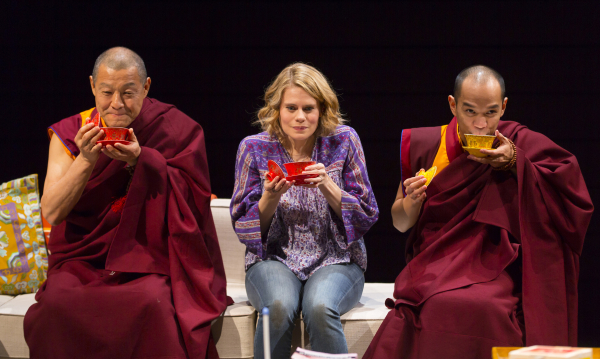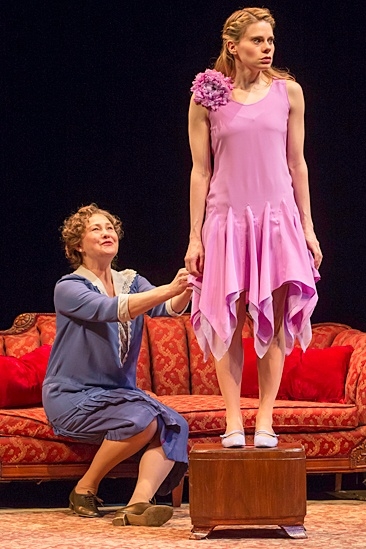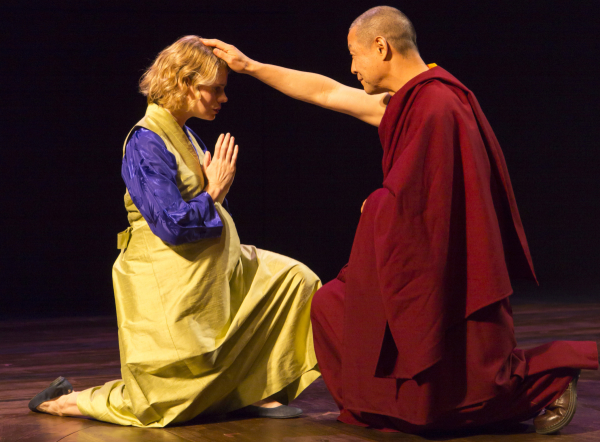Celia Keenan-Bolger, Star of The Oldest Boy, Meditates on Happiness in the Theater

(© T. Charles Erickson)
In the Buddhist faith, everything starts and ends with "dukkha": the anxiety, discontent, and general suffering that burdens daily life. "I have taught one thing and one thing only," said the enlightened Buddha: "dukkha and the cessation of dukkha."
Perhaps this term is foreign to the Manhattan theater community, but the concept itself could not be embedded more thoroughly in its everyday culture— surprisingly so, as actress Celia Keenan-Bolger discovered through her journey with Sarah Ruhl's newest play, The Oldest Boy, now running at Lincoln Center's Mitzi E. Newhouse Theater.
Keenan-Bolger, most recently seen on Broadway as Laura Wingfield in the acclaimed revival of The Glass Menagerie, stars in this world premiere as Ruhl's ambiguously named "Mother" — a woman who, after marrying a native Tibetan, adopts his Buddhist traditions. In the process, she finds a source of remarkable wisdom, happiness, and principles she hopes to pass onto their young son Tenzin. Yet in a cruel twist of fate, the spiritual refuge that brings her to her highest peaks of joy drags her down to the deepest trenches of pain as Tenzin, who has been identified as a reincarnated lama, is removed from her home to take his monastic vows.
"The religion brings her all of this happiness and then creates more pain than anything else she's ever experienced in her life," said the actress, elucidating the character on whom she has been meditating (literally) for nearly nine months. "I just think that is such a deep, dark, and different part of what it is to be alive."

(© Michael J. Lutch)
This duality certainly finds itself at the core of what it is to be in show business. In the theater, dukkha often seems an inescapable way of life: a neverending cycle of joy and sorrow, coming in powerful gusts as unpredictable as a summer thunderstorm. Even Keenan-Bolger, with three Tony nominations, two Drama Desk Awards, and a sterling reputation as Broadway's sweetheart, is not immune to this tumultuous merry-go-round. "Something happens and you're totally fulfilled, and then something else happens and it's like that great thing never even happened," she frustratedly acknowledged.
These connections were not immediately apparent to Keenan-Bolger as she began preparations for her Lincoln Center run with The Oldest Boy. The idea to delve more into the play's religious content came only after completing a preliminary three-week workshop this past July. "I knew I had until the end of August before we started rehearsals," she said. "I started to think about exploring what these principles of Buddhism are, because I think this character has dug into that."
With a spark of ambition and some free time on her hands, she made a plan to join in a Buddhist retreat in upstate New York — a commitment she nearly reneged on the morning she was scheduled to leave.
Despite her hesitations, she took the two-hour train ride up to the retreat — a serene setting on acres of land where the participants engaged in guided meditations, hikes through the woods, and daily teachings from the resident monks.
"I was so self-conscious about being there," she said. "I was like, 'I'm doing…um…research for a play.' That's how I led with everything. I was doing it for the play. It ended up almost immediately being very clear to me that it was going to be more about me."
"The first evening was a huge talk about happiness," she recalled. "The monk that taught us said, 'Americans are so incredible about being productive and keeping themselves busy and active. But we're not good at being happy.'"
This notion is one that struck a particularly personal chord with the actress. "That's such an enormous part of my identity," she admitted. "I want to be a hard worker. I want to be busy all the time."
In an industry that's constantly churning — where bigger and better jobs are always just out of reach and your colleagues are simultaneously your competitors — it's difficult not to adopt a myopic view of success where busyness is the goal and anyone who stands in your way becomes the enemy. "Particularly," Keenan-Bolger said, "where there's so much rejection and so many times to look at other people and feel like, if I only had what they have."
"There is this notion of Buddhism that every single thing is exactly as it is meant to be," she said. "The only control you have is your response to the way something went. When it comes to demonizing other people for what they get, it's just so worthless. Maybe it feels good in the moment, but long-term it's not a sustainable model. It only leads to suffering. That doesn’t mean that those other thoughts don't come in," she added. "It just means that when they come in, I counter them. I think that makes for an easier way to get through this life that I've chosen for myself."
When rehearsals began for The Oldest Boy at the end of the summer, she came not only with insights into her character, but insights into herself as an individual finding her footing in this unpredictable and all-engrossing business.
"This play has been such a gift on a lot of levels," she said. "I'm not going to become a practicing Buddhist, but there are so many principles that have helped me consider how to be a happier person. As an adult, those things don't really come around that much."
As someone for whom religion has never played a significant role, she described the experience as a window into the world of rigorous religious practice. Yet, as her director, Rebecca Taichman, noted in a letter she composed to her cast during preview performances, the repetition ingrained in religious and meditative practices is strongly akin to the repetitive nature of the theater — doing the same thing night after night in search of a boundless depth.
"My religion has been the theater," she agreed. "I know how to do that over and over and over again."
Still, like her character's Buddhist faith, the potential for disappointment and dukkha remains great. "When you embrace something, you have to get all of it — and that means sometimes it's going to turn on you…It's just a good reminder that we can't pick and choose the good stuff," she said with contentment.

(© T. Charles Erickson)










